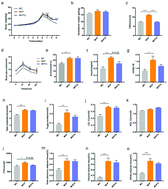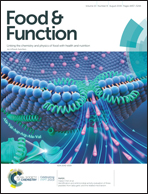Gut microbiota might be a crucial factor in deciphering the metabolic benefits of perinatal genistein consumption in dams and adult female offspring†
Abstract
Adverse early-life exposures program an increased risk of chronic metabolic diseases in adulthood. However, the effects of genistein consumption in early life on metabolic health are unclear. Our objective was to investigate whether perinatal genistein intake could mitigate the deleterious effects of a high-fat diet (HF) on metabolism in dams and female offspring and to explore the role of the gut microbiota in mediating the transgenerational effects. C57BL/6 female mice were fed a HF, HF with genistein (0.6 g kg−1 diet) or normal control diet for 3 weeks before mating and throughout pregnancy and lactation. The offspring had free access to normal diet from weaning to 24 weeks of age. A glucose tolerance test was performed and the levels of serum insulin and lipid were measured. The cecal contents were collected for 16s rDNA sequencing. The results showed that perinatal genistein intake could not only significantly reduce blood glucose levels, insulin and free fatty acids (FFA) in dams, but also improve glucose tolerance, insulin sensitivity and serum lipid profiles in adult female offspring. Significant enrichment of short-chain fatty acid (mainly butyrate)-producing bacteria might play crucial roles in deciphering the metabolic benefits of perinatal genistein intake in dams. The obvious decrease in harmful microorganisms and increase in Erysipelotrichaceae_incertae_sedis were associated with the protective effects of maternal genistein intake on female offspring. In addition, Bifidobacterium might be an important factor for deciphering the metabolic improvement in both dams and female offspring by dietary genistein. Overall, perinatal genistein intake attenuated the harmful effects of HF on metabolism in both dams and female offspring, and the protective effects were associated with the alterations in the gut microbiota, which provides new evidence and targets for mitigating the poor effects of adverse early-life exposures on metabolic health in later life.



 Please wait while we load your content...
Please wait while we load your content...